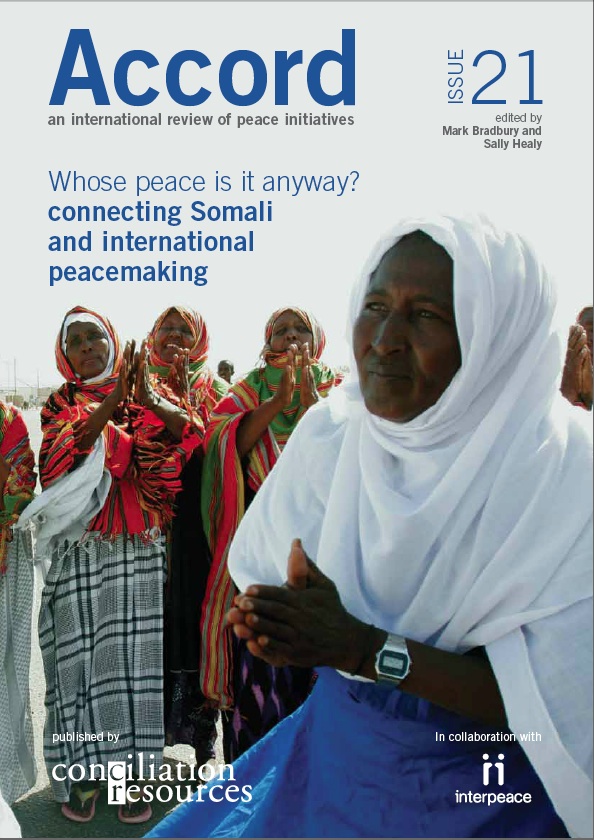At its simplest, a constitution is nothing more than a document that sets out the basic principles or established precedents according to which a state (or other organisation) is to be governed. It will usually entrench and institutionalise political agreements, define the state and its population and frame the rules for the lawful exercise of authority.
In ideal terms constitutions describe a social contract between rulers and ruled, explicitly formulating the obligations, rights and duties of the two sides. Considering the fundamental importance of ‘contract’ (xeer) in Somali social order and the multiplicity of contracts that actually regulate social relationships among Somali clans and lineage groups, it might be supposed that constitution making in the Somali context would be a reasonably straightforward undertaking. As the three case studies presented here of different Somali constitution-making processes illustrate, in reality this has not been the case.
The studies refer to three rather different types of constitution making. Kirsti Samuels outlines failed attempts to develop a national constitution for the Transitional Federal Government (TFG) in 2006. Ahmed Abbas and Ruben Zamora describe the process of developing a constitution for the State of Puntland since 1998. Ibrahim Hashi assesses the rather more successful constitution-making process in the self-declared Republic of Somaliland.
The authors bring different perspectives to bear on the process. Samuels was engaged by the United Nations as a constitutional expert to assist the nascent TFG. Ahmed Abbas and Ruben Zamora work for Interpeace, an international peacebuilding organisation, on a donor funded democratisation project supporting civil society involvement in the constitutional process in Puntland. Ibrahim Hashi, an independent lawyer, offers an analysis of the experience of developing a constitution in Somaliland without external assistance, and the political challenges of sticking to the rules laid down by the constitution.
The challenges of constitution making in the Somali context illustrate all too clearly the contested nature of statehood. For most countries emerging from conflict, the territorial definition of the state and its population is a given. This is not the case in Somalia.
It is instructive that the most successful case of constitution making to date is that in Somaliland, where the act of agreeing a constitution through a plebiscite was intimately linked to the formalisation of separate statehood and termination of the 1960 union with Somalia.
Puntland is a different case where a constitution has been developed for a federated state, notionally forming part of a federal state of Somalia that has not yet been defined legally and does not exist as a political entity.
The concept of a constitution for Somalia as a whole – as defined internationally – is deeply constrained by the constitutional advances in both Somaliland and Puntland. Yet many of the Islamist groups now in the ascendant in south central Somalia favour a unitary rather than a federal state. The more militant Islamists oppose Western-style constitution making itself as an implicit challenge to Shari’a law. Some would go further to reject the existing territorial definition of Somalia in favour of an Islamic emirate embracing all the Somali people in the Horn of Africa.
Aside from identity problems there are the difficulties of re-establishing forms of central government for a society where political authority is traditionally decentralised. The regulation of political power is never easy, but even the basics of statehood – the government’s right to monopolise force and its duty to protect citizens, the concept of individual rights, responsibilities and obligations under the law – are tempered in the Somali context by the primacy of clan and xeer, which provide the basis not only of political solidarity but also the foundations of law and order and personal security.
The international template for statebuilding after conflict now follows a fairly consistent pattern. The typical sequence is a peace agreement, the establishment of a power-sharing government under a transitional charter, the development of a draft constitution by an independent commission with the help of international experts, followed by a public consultation process, which is regarded as part of the democracy and peacebuilding process.
After endorsement by the relevant legislative bodies the constitution is often submitted for formal public approval through a popular referendum. Once adopted, elections are normally held on the basis of the new constitutional arrangements.
What has been the Somali experience of constitution making to date? Elements of the internationally-favoured, process-heavy and ‘politics-lite’ approach have been tried in Somalia, as these case studies show.
Somaliland, Puntland and Somalia are all at different stages in a process of moving from a peace agreement, to a transitional charter, to a constitution, a referendum and elections. The results have been mixed and generally disappointing from the perspective of the practitioners involved in them.
But one lesson seems to be that success correlates with the strength of the political arrangements that underpin the process. Somaliland’s constitutional system continues to be challenged by political events. But it has shown itself to be built on strong foundations, demonstrating considerable resilience in the face of political challenges for well over a decade.
Puntland’s process is newer. After nine years in the making, a draft was approved by the legislature in 2009 but has yet to adopted by the executive or endorsed by the public. In both the Somaliland and Puntland cases – and despite a reasonable level of political consensus – the making of a formal constitution has taken very much longer than anticipated.
Term extensions, in breach of constitutional provision, have posed challenges in Puntland as they have in Somaliland and in each case a political compromise has provided a short term solution. But the process of constitution making has helped to consolidate peace and create structures of government that possess public legitimacy. At the national level no such progress has been made since 2006 and none seems likely without a broader political settlement behind it.

